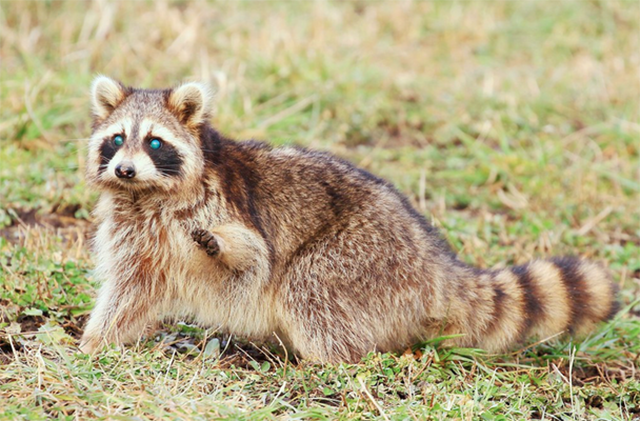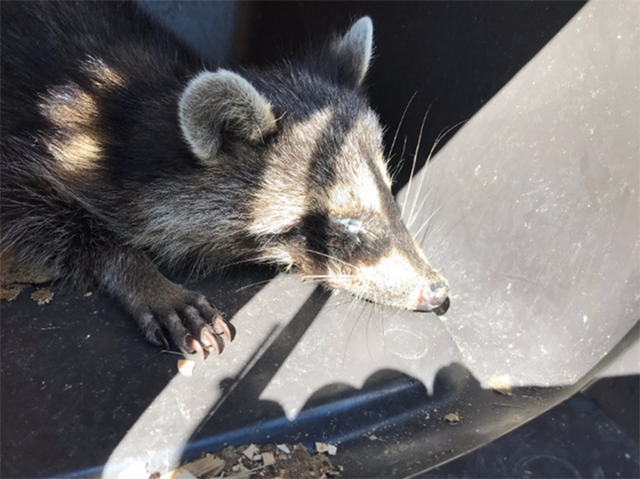
Each fall the City of Dublin receives an increase in the number of calls for sick raccoons (and sometimes skunks). Many of the raccoons are exhibiting signs consistent with Canine Distemper Virus.
Canine Distemper (CDV) is a virus that is generally always present in the raccoon population although at low levels. Distemper cases in raccoons tend to spike in the fall. This is the same virus that dogs can contract, which owners are advised to vaccinate for.
Raccoons with distemper may act tame and approach people, or curl up to sleep in open areas in close proximity to people. They generally act disoriented or lethargic, walk in a staggering gait or stand in place as if very confused. They will display increasing abnormal behavior as the disease progresses, including wandering in the daytime, and the eyes may appear to be an iridescent green as they become cloudy from mineral deposits in cell layers of the eye caused by the virus.
Canine Distemper does not pose a threat to human health. Dogs who have not been vaccinated for distemper can become infected if they come in contact with a raccoon with distemper.
What is Canine Distemper?
Canine Distemper is a viral disease affecting animals in the canine families in addition to some other mammals. It affects the respiratory, gastrointestinal and nervous systems. Raccoons are pre-disposed to this disease as are dogs. It also commonly infects skunks. The disease is most often fatal and wildlife suffering from CDV are humanely euthanized. Dogs with distemper may recover but usually will display permanent neurological damage.
Can humans catch Canine Distemper?
No. Humans are not susceptible to canine distemper.
Can my dog catch Canine Distemper?
Yes… if your dog has not been vaccinated against distemper, and comes into contact with a raccoon with distemper. Most dogs are vaccinated as pups against distemper and regular booster shots may be given. If you are not sure, check with your veterinarian. Puppies who have not yet been vaccinated are at particularly high risk. To keep your pet safe, it is best to keep your dog on a leash when on walks and scan your backyard before letting your dog out.
What are the symptoms of a raccoon with Canine Distemper?
Raccoons with distemper may move slowly and may stumble as they walk. They lose their fear of humans, appear blind and confused and may wander aimlessly. They become aggressive if cornered. A mucus discharge will often be present around the eyes and nose and may be accompanied by coughing, diarrhea, vomiting, tremors, seizures or chewing fits. They may only exhibit some of these symptoms and otherwise appear quite healthy.
What should I do if I see a raccoon that I think has Canine Distemper?
Do not approach a sick raccoon. Do not feed raccoons. For general assistance with a raccoon or other wild animal that is exhibiting abnormal behavior:
- Contact Barbara Ray, Nature Education Coordinator at 614.309.6916 or bray@dublin.oh.us
- Call the Dublin Police non-emergency line at 614.889.1112
- Report it using the GoDublin App – download it at dublinohiousa.gov/godublin
What should I do if I see a dead raccoon?
If you see a deceased raccoon in your yard, you may double bag the animal and place in your regular Rumpke bin. To bag a deceased small animal, wear gloves, place the first bag over the animal and wrap it around (you do not need to touch the animal) to roll it in the bag. Tie the bag and place that bag into a second bag. This prevents germs from spreading and controls odor. The city will pick up deceased wildlife on City property, streets and curbside. If you need assistance with a deceased animal, contact us!
Can anything be done to help the raccoons?
Once a raccoon is infected, there is little to no chance of survival for the animal. It can take several weeks for the disease to run its course in the raccoon. Young raccoons are most susceptible to this virus and the disease is seen more frequently in the fall as young raccoons begin to disperse and seek a home territory. The best way to help an infected animal is to contact the City of Dublin, who will ensure the animal is humanely taken care of and does not continue to suffer or spread the infection.
Should I feed the raccoons?
No. Do not feed raccoons or leave food out for them. Any food that is left out may only attract other wildlife, or attract sick raccoons to areas that pets frequent. Calling the City is the best thing you can do for these affected raccoons.
Keep bird feeding areas clean. If a distemper raccoon or skunk is found in your area near bird feeders, it is helpful to all the wildlife to temporarily take down the feeder and let that area rest. Sun and rain will naturally ‘sterilize’ the ground if wildlife traffic is reduced for a time. Distemper virus can live about 14 hours outside of its host.
How else can I help?
To discourage raccoons or any wildlife from coming onto your property:
- Do not leave any food out. At this time, it would also be advisable to take down any bird feeders, or regularly clean up the area around the bird feeder so you do not attract raccoons
- Ensure all garbage, recycling and compost containers are secure
- Keep your pet on a leash when on a walk and scan your yard before letting them outside
- Explain to your children why they should not approach raccoons or any wildlife even if they seem docile
- Check with your vet to ensure your dog has been vaccinated against distemper if you are not sure
What is the City doing to assist?
As a public service, the City of Dublin provides wildlife information, alerts and resources online at dublinohiousa.gov/nature.
The City provides rescue and pick up for sick and injured wildlife. This service is dispatched through the police department. Residents and businesses should call Dublin Police at 614.889.1112 for assistance with injured or sick wildlife needing rescued. Wildlife that is healthy and behaving normal will not be picked up.

What does distemper look like? Juvenile raccoon with distemper displaying runny eyes, blindness, seizures and difficulty standing.
